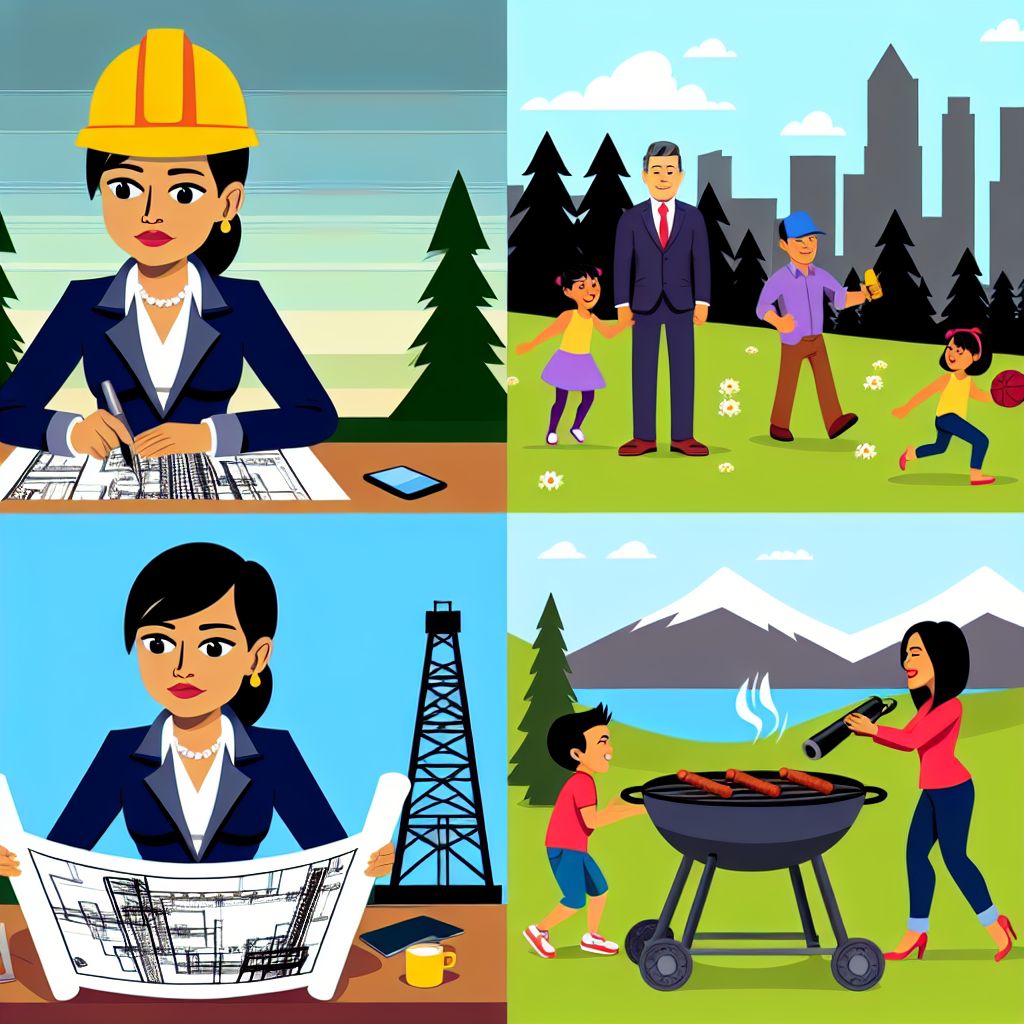Establishing Clear Work Boundaries
Recognizing the Importance of Boundaries
Setting clear work boundaries is essential for work-life balance.
Boundaries help maintain mental health and personal well-being.
Furthermore, they enhance productivity during work hours.
Strategies for Setting Limits on Work Hours
First, determine your core working hours.
For instance, aim to work from 9 AM to 5 PM consistently.
Next, communicate these hours to your colleagues and supervisors.
This helps manage expectations on availability.
Create a Dedicated Workspace
A dedicated workspace reinforces the separation between work and home life.
This space should be free from distractions.
Additionally, it should be equipped with all necessary tools.
Establish Clear Communication
Communicate openly with your manager about your work limits.
Let them know when you are unavailable.
This fosters understanding and respect for your time off.
Use Technology Wisely
Take advantage of tools to help manage work-life boundaries.
For example, use calendar apps to block out personal time.
Also, consider setting up an out-of-office message when needed.
Implement Regular Breaks
Regular breaks throughout the day boost focus and productivity.
Schedule short breaks to recharge your mind.
Consider using techniques like the Pomodoro Technique for reminders.
Prioritizing Work Tasks
Identify your most important tasks each day.
Focus on completing high-priority items first.
This can help prevent work from spilling over into personal time.
Embrace Flexibility
Be willing to adjust your schedule when necessary.
Flexibility can ease stress and enhance work satisfaction.
However, always return to your established boundaries afterward.
Unlock Your Career Potential
Visualize a clear path to success with our tailored Career Consulting service. Personalized insights in just 1-3 days.
Get StartedPrioritizing Tasks
Understanding Workload Management
Managing workload efficiently is crucial for petroleum engineers.
It helps in meeting project deadlines and avoiding burnout.
Therefore, begin by assessing your tasks regularly.
Identify which tasks are urgent and important.
Then, categorize tasks based on their priority levels.
Effective Prioritization Techniques
Utilizing prioritization techniques enhances productivity.
Consider the Eisenhower Matrix for task organization.
This method separates tasks into four categories.
- Urgent and Important
- Important but Not Urgent
- Urgent but Not Important
- Neither Urgent nor Important
Focus on tasks that fall into the first category.
Next, delegate less important tasks when possible.
Time Management Strategies
Time management plays a vital role in effective prioritization.
Use techniques like the Pomodoro Technique for sustained focus.
Set a timer for 25 minutes of focused work, followed by a short break.
This approach helps maintain high energy levels throughout the day.
Additionally, create a daily schedule to plan your tasks.
Include breaks to enhance overall productivity.
Leveraging Technology
Technology can aid in prioritizing tasks effectively.
Utilize project management tools like Asana or Trello.
These tools enable better organization and tracking of tasks.
Moreover, set reminders for important deadlines.
This helps to stay focused on your priorities.
Regular Review and Adjustment
Regularly reviewing your priorities is essential.
Adjust your task list based on changing circumstances.
Hold weekly reviews to evaluate your progress.
This practice promotes accountability and focus.
Ultimately, it allows you to remain adaptable in your work.
Incorporating Flexibility
Understanding the Need for Flexibility
Petroleum engineers often work in demanding environments.
These settings can make work-life balance challenging.
Recognizing the need for flexibility is essential.
It helps in managing both personal and professional responsibilities.
Options for Flexible Work Arrangements
Employers can offer various flexible arrangements.
Remote work is a popular choice for many engineers.
This setup allows them to work from home or other locations.
Another option is flexible hours.
Employees can start and end their workdays as needed.
Implementing Technology Solutions
Technology plays a vital role in facilitating flexibility.
Using project management tools can streamline workflows.
These tools allow teams to collaborate efficiently, regardless of location.
Video conferencing also enhances communication.
It brings team members together virtually for meetings.
Open Communication and Support
Encouraging open communication is crucial in any flexible arrangement.
Managers should support their teams in achieving work-life balance.
Regular check-ins can help address challenges early.
Employees should feel comfortable discussing their needs.
Company Culture and Values
A supportive company culture promotes flexibility.
Organizations should value work-life balance in their mission.
This commitment will attract and retain talent in the long run.
Companies can also highlight flexibility in their hiring processes.
Creating a Plan for Implementation
To implement flexible arrangements, companies should create a plan.
This plan should involve input from employees across all levels.
Regular reviews can help refine these arrangements as needed.
Feedback from employees will guide adjustments.
You Might Also Like: Why Metallurgical Engineering is a Future-Proof Career
Time Management Skills
Identifying Your Priorities
Start by determining what tasks are most important in your role as a petroleum engineer.
This clarity will help you allocate your time effectively.
Consider using a priority matrix to categorize tasks.
Focus first on high-impact activities that directly influence your projects.
Next, ensure that you set aside time for personal commitments.
Creating a Structured Schedule
Develop a detailed weekly schedule to outline your commitments.
Include work projects, meeting times, and personal activities in your planner.
Be realistic about how much time tasks will require.
Use digital tools like Google Calendar or project management apps for better organization.
Review and adjust your schedule weekly to adapt to changes.
Utilizing Time Management Techniques
Consider implementing the Pomodoro Technique for enhanced focus.
This method alternates work sessions with short breaks.
You can maintain both productivity and mental clarity throughout your day.
Beyond that, setting specific time limits for tasks can help you work more efficiently.
Using timers can create a sense of urgency that boosts productivity.
Minimizing Distractions
Identify common sources of distraction in your work environment.
This could include noise, frequent interruptions, or digital device alerts.
Then, take proactive measures to reduce these distractions.
For example, you can use headphones to minimize background noise.
Setting boundaries with colleagues can also enhance your focus.
Balancing Work and Personal Life
Set clear boundaries between work and personal time.
Communicate your availability to colleagues and supervisors.
Be mindful of personal time by scheduling it in your calendar.
Prioritize self-care to maintain your energy and well-being.
Lastly, make a habit of reflecting on your work-life balance regularly.
You Might Also Like: Importance of Metallurgical Engineers in Modern Society
The Importance of Downtime
Downtime plays a crucial role in overall well-being.
As a petroleum engineer, the demands of the job can be overwhelming.
Recognizing the need for rest is essential for maintaining performance.
Continuous work without breaks can lead to burnout.
Consequently, taking time off can enhance productivity and creativity.
Understanding the Benefits of Downtime
Downtime allows the mind to reset and recharge.
It helps in improving decision-making skills.
Moreover, stepping away from work can boost problem-solving abilities.
Engineers often face complex challenges that require fresh perspectives.
Resting can lead to innovative solutions to difficult problems.
Strategies for Incorporating Downtime
Scheduling regular breaks during the workday is crucial.
Try using the Pomodoro technique for effective time management.
This method encourages focused work followed by short breaks.
Additionally, taking full days off can refresh both mind and body.
Engaging in Leisure Activities
Discover hobbies that help you unwind after work.
Physical activities such as hiking or jogging can relieve stress.
Consider joining a local sports league or fitness class.
Creative outlets like painting or writing can also provide relaxation.
Prioritizing Family Time
Allocate quality time to spend with loved ones.
Family activities foster strong relationships and emotional support.
Plan regular outings or meals together to strengthen bonds.
Furthermore, enjoying time with pets can be incredibly rejuvenating.
Overcoming Barriers to Downtime
Work pressures often discourage taking breaks.
Developing a supportive work culture can encourage relaxation.
Discussing workload management with supervisors is essential.
Finally, set boundaries to protect personal time from work-related demands.
Discover More: How to Land an Internship in Aerospace Engineering

Building a Support Network
Creating a Supportive Work Environment
A supportive work environment is crucial for petroleum engineers.
Connecting with colleagues promotes teamwork and collaboration.
Engaging in regular meetings fosters open communication.
Consider establishing mentorship opportunities within your team.
Mentors can provide guidance and share valuable experiences.
Additionally, join industry associations for networking opportunities.
These organizations often offer resources and support for professionals.
Establishing a Supportive Home Environment
Support at home is equally important for a balanced life.
Communicate openly with family about your work demands.
Encourage family members to share their own needs and challenges.
Creating a routine can help everyone feel more grounded.
Allocate time for family activities to strengthen bonds.
Set boundaries to protect your personal time from work obligations.
This practice prevents work from interfering with family life.
Leveraging Professional Networks
Building a professional network can greatly enhance your career.
Attend industry conferences to meet peers and experts.
Use social media platforms to connect with other professionals.
Participate in online forums and discussions to share insights.
This interaction can lead to new opportunities and collaborations.
Engage in continuous learning by attending workshops or webinars.
These activities can refresh your knowledge and skills.
Encouraging a Culture of Support
Encouraging a culture of support within your workplace is essential.
Offer help to your colleagues when they face challenges.
Recognize the efforts of your team members regularly.
This practice builds morale and encourages a positive environment.
Celebrate team successes to reinforce a sense of community.
Involvement in group activities can strengthen relationships.
Consider organizing team-building exercises to enhance collaboration.
Find Out More: Career Pathways in Biomedical Engineering
Engaging in Hobbies
Importance of Hobbies
Hobbies provide a vital outlet for stress relief.
They create a balanced life outside of work obligations.
Moreover, they foster creativity and personal growth.
Finding Time for Personal Interests
Begin by assessing your current schedule.
Identify blocks of time that can be dedicated to hobbies.
Try setting aside specific time slots each week.
Additionally, prioritize your personal interests alongside work commitments.
Exploring New Activities
Consider exploring activities that excite you.
Join local clubs or groups centered around your interests.
Activities can range from art classes to hiking groups.
Connecting with others helps to maintain motivation.
Setting Realistic Goals
Set achievable goals for your hobbies.
Focus on quality rather than quantity in your pursuits.
Celebrate small wins to keep your spirit high.
Ultimately, enjoyment is the key focus of any hobby.
Integrating Hobbies into Your Routine
Incorporate short hobby sessions into your daily routine.
Even 15 minutes can make a difference in your well-being.
For example, read during lunch breaks or practice a musical instrument after work.
These small actions contribute significantly over time.
Leveraging Technology
Tools to Enhance Productivity
Productivity tools help streamline your work process.
Consider using project management software like Trello or Asana.
These platforms allow you to track tasks and deadlines efficiently.
Additionally, digital calendars like Google Calendar help organize your schedule.
Using reminders ensures you never miss an important meeting.
Apps for Time Management
Time management apps can boost your efficiency.
Tools like Toggl allow you to track your working hours effectively.
This awareness helps you estimate time better for future projects.
Moreover, the Pomodoro Technique can enhance focus and productivity.
Consider using apps like Focus@Will to maintain concentration.
Communication Tools for Flexibility
Effective communication tools promote collaboration.
Platforms like Slack facilitate real-time conversations.
They can replace lengthy email threads, saving you time.
Moreover, video conferencing tools like Zoom connect you with teams globally.
This flexibility supports remote work, improving work-life balance.
Health and Wellness Applications
Maintaining well-being is crucial for engineers.
Fitness apps like MyFitnessPal encourage healthy habits.
Meditation apps such as Headspace promote mental wellness.
Taking breaks to focus on health improves overall productivity.
Scheduling time for exercise becomes easier with these apps.
Additional Resources
Technical Writing: I Broke in as a Technical Writer – You Can Too
I’ve worked on Canadian rigs for nearly five years. What do you want …




